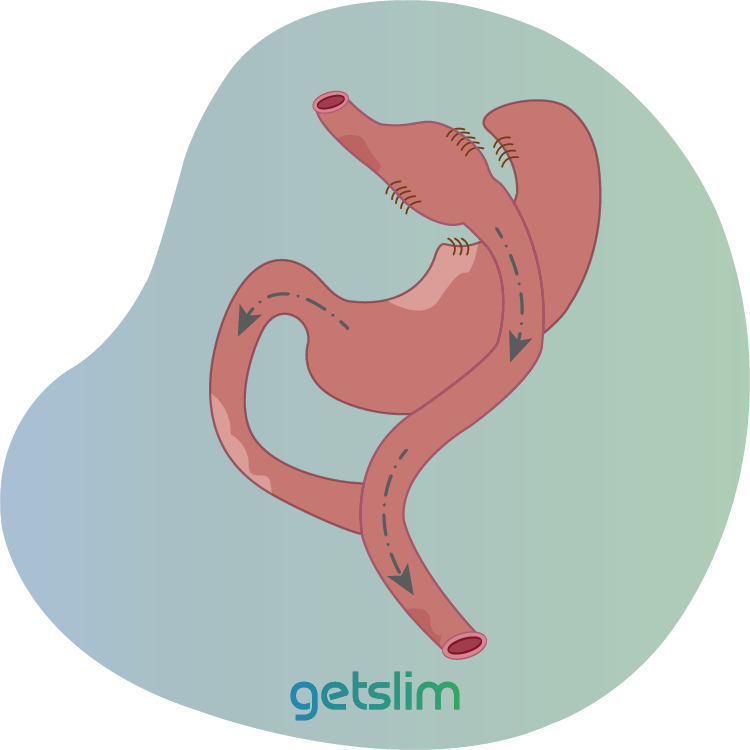Gastric Bypass Surgery in Turkey / Antalya – Cost £2,990
Discover the advantages of Roux-en-Y gastric bypass in Antalya: Quick treatment, comfortable hospital stay, and cost-effective prices with top-notch medical care.
1 - 3 Hours
4 Nights
from £2,990
The Roux-en-Y gastric bypass is a commonly performed weight loss surgery. During this procedure, a small pouch is formed from the stomach and then directly connected to the small intestine. This allows food to bypass most of the stomach and the beginning of the small intestine by entering the reduced stomach pouch directly into the distal part of the small intestine. This facilitates weight loss even without requiring significant changes in eating habits.
Many people in Germany only consider gastric bypass surgery after attempting weight loss through dietary and exercise adjustments. An appealing option in this regard is the Roux-en-Y gastric bypass in Turkey. When performed by competent doctors, the costs for the procedure in Turkey are often significantly lower than in Germany. Another advantage is the excellent medical care before and after the surgery in Turkey. This allows patients to quickly adapt to the new feeling of fullness and fully harness the benefits of the operation.
Individuals with a BMI of 40 or higher
For those with a BMI between 35 and 39.9 and additional health issues such as type 2 diabetes, hypertension, or severe sleep apnea
In certain cases, the procedure may also be considered for individuals with a BMI between 30 and 34, especially if there are significant health problems.


Before starting the Roux-en-Y gastric bypass, Turkish specialists conduct a thorough examination and consultation with patients. The detailed screening process is designed to ensure the best possible results in line with the patient’s health conditions and goals. Depending on an individual’s condition, doctors may provide recommendations for nutrition, lifestyle, and behavioral changes after the gastric bypass surgery to address potential discomfort.
The Roux-en-Y gastric bypass surgery is performed in a specialized Turkish clinic. The hospital stay typically lasts three to five days, depending on individual recovery. For the operation, you will be placed under general anesthesia, with the effectiveness of the anesthesia continuously monitored by the anesthesiologist. At the same time, your circulation will be monitored.
Using either open or laparoscopic techniques, the surgeon proceeds to reduce the size of the stomach. The result is a stomach pouch about the size of a walnut, capable of holding only a very limited amount of food. In the next phase, the small intestine is divided, and a section is attached directly to this stomach pouch. This allows food to enter the reduced stomach and then pass directly into the small intestine. Through this process, a significant portion of the stomach and the upper part of the small intestine are bypassed, directing the food directly into the middle part of the small intestine. This leads to a drastic reduction in calorie intake and results in weight loss.
In Turkey, Roux-en-Y gastric bypass surgeries are performed using state-of-the-art techniques. While some patients may require surgery with traditional large (open) incisions due to their individual circumstances or at the recommendation of the surgeon, the majority of Roux-en-Y gastric bypass surgeries are performed laparoscopically, using the minimally invasive keyhole technique. This method offers the advantage of smaller incisions and typically results in a faster recovery.
Gastric bypass surgery can yield impressive results in terms of weight loss. Depending on the type of procedure performed and subsequent lifestyle changes, patients can lose up to 60 percent or more of their excess weight within two years. This not only represents a significant physical transformation but can also greatly enhance patients’ self-confidence and overall well-being.
In addition to pure weight loss, gastric bypass surgery also offers health benefits. Many of the health issues associated with obesity can be reduced or even completely eliminated through this operation. This improves the overall quality of life and the health well-being of the patient.


In Turkey, before a Roux-en-Y gastric bypass, a detailed pre-examination is conducted. Your medical team will inform you about the necessary laboratory tests and medical checks.
After the surgery, your diet is gradually adjusted: from liquids to pureed and eventually soft foods. The medical team carefully monitors this transition.
To prevent deficiencies, special vitamin and mineral supplements are recommended to you.
Every surgery carries risks, and when undergoing a procedure abroad, additional factors such as language barriers or cultural differences may come into play. It is advisable to gather information thoroughly and plan for post-operative care in your home country.
Everything About the Costs of Roux-en-Y Gastric Bypass in Turkey: Your Questions, Our Answers.
The surgery usually takes a few hours. After the surgery, you will wake up in a recovery room where the medical staff will check if you have any complications.
Immediately after the Roux-en-Y gastric bypass surgery, you can receive fluids but not solid food as your stomach and intestines begin to heal. You will then follow a special diet that gradually transitions from a liquid diet to a pureed diet. You are allowed to consume soft foods and progress to more solid foods as your body tolerates them. You will also receive vitamin and mineral supplements from the medical staff and the medical team to ensure optimal nutrition and healing.
Gastric bypass surgery may result in prolonged weight loss. Weight loss depends on the type of Roux-Y gastric bypass and lifestyle changes you make. You could lose 60 percent or more of your excess weight in two years.
In addition to actual weight loss, Roux Y gastric bypass can reduce or eliminate many of the side effects of obesity.
Whether a Roux-en-Y gastric bypass or a sleeve gastrectomy (also known as sleeve gastrectomy) is “better” depends on the individual needs, goals, and health circumstances of the patient. Both procedures have their own advantages and disadvantages. Here is a brief comparison:
1. Operation: A small pouch is created from the upper stomach, and the small intestine is rerouted so that food bypasses most of the stomach and a portion of the small intestine.
2. Advantages:
Typically results in greater and sustained weight loss compared to sleeve gastrectomy.
May be better for individuals with severe obesity or certain health issues (e.g., diabetes).
Disadvantages: More complex procedure with potential risks such as leaks or nutrient deficiencies.
1. Operation: A significant portion of the stomach is removed, creating a banana-shaped “sleeve.”
2. Advantages: Simpler surgical procedure compared to Roux-en-Y gastric bypass.
No rerouting of the small intestine, therefore lower risk of nutrient deficiencies.
3. Disadvantages: Typically results in less weight loss compared to Roux-en-Y gastric bypass.
Irreversible as a part of the stomach is permanently removed.
The choice of the best procedure should be made after thorough consultation with a bariatric surgeon, taking into consideration the patient’s individual health situation and goals. It’s also important to remember that the success of any surgery depends on the patient’s commitment to lifelong behavioral and dietary changes.
Choosing to undergo Roux-en-Y gastric bypass surgery in Turkey with GetSlim offers several advantages:
Gastric bypass and mini-gastric bypass are both bariatric surgeries performed for weight loss, but there are some differences in their techniques and approaches. Here are the main differences between the two procedures:
It’s important to emphasize that the choice between gastric bypass and mini-gastric bypass should be made on an individual basis and depends on many factors, including the patient’s anatomical conditions, medical history, and the preferences and experiences of the surgeon. It is essential to consult with an experienced bariatric surgeon to determine the best option.
+90 542 407 75 70
+90 542 407 75 70
info@getslimturkey.com